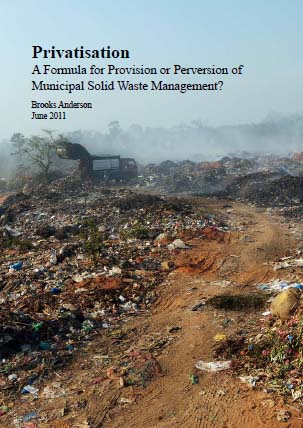Brooks Anderson
Is privatisation a formula for provision or perversion of municipal solid waste management?
Posted on 24 Jun, 2011 09:17 PM
In 2000, in response to a Supreme Court order, the Government of India formulated and enacted the Municipal Solid Wastes (Management and Handling) Rules (hereafter referred to as the Rules) to mitigate a burgeoning solid waste crisis. Pollution from haphazard municipal solid waste disposal was gravely jeopardizing public health, thereby undermining the nation’s development gains.
The Rules’ prime objective was to protect public health and the environment by minimizing disposal of waste in landfills, thereby aligning the government’s municipal waste management policy with its commitments to international treaties to reduce greenhouse gas emissions, control the production of persistent organic pollutants, conserve finite resources, and achieve broad development targets.
Inspiring progress: Learning from Exnora Green Pammal's solid waste management partnerships in four localities
Posted on 01 Sep, 2010 02:16 PMThis booklet by Exnora Green Pammal (EGP) begins by highlighting the grave situation in relation to solid waste management in the country and the steps undertaken by the government to tackle this issue. The document presents a review of the efforts undertaken by EGP, an NGO based in Chennai, which has been implementing solid waste management projects with a variety of local bodies in accordance with the government’s rules.
India’s solid waste crisis is undermining the nation’s efforts to improve public health, protect the environment and stop climate change. India produces a staggering amount of municipal solid waste every day and the rate of production is expected to climb steadily as the nation becomes more populated, urbanised and economically developed.
Although the Indian government has enacted rules for management and handling of municipal solid waste, the results as per the year 2010 indicate that most localities have not fully complied with the rules and the situation has found to be getting worse day by day. Widespread, prolonged noncompliance with the rules and the rapid, highly-visible environmental degradation has led to calls for a changes in the nation’s waste management policy.